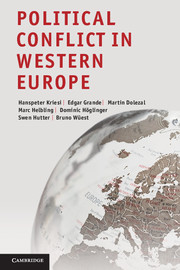Book contents
- Frontmatter
- Contents
- List of Figures
- List of Tables
- Preface and acknowledgments
- Part I Theory and methods
- Part II The development of the ‘integration–demarcation’ cleavage
- Part III Public debates: the articulation of the new cleavage in detail
- 8 The impact of arenas in public debates over globalization
- 9 Culture versus economy: the framing of public debates over issues related to globalization
- 10 Actor configurations in the public debates on globalization
- Part IV Conclusion
- References
- Index
10 - Actor configurations in the public debates on globalization
Published online by Cambridge University Press: 05 August 2012
- Frontmatter
- Contents
- List of Figures
- List of Tables
- Preface and acknowledgments
- Part I Theory and methods
- Part II The development of the ‘integration–demarcation’ cleavage
- Part III Public debates: the articulation of the new cleavage in detail
- 8 The impact of arenas in public debates over globalization
- 9 Culture versus economy: the framing of public debates over issues related to globalization
- 10 Actor configurations in the public debates on globalization
- Part IV Conclusion
- References
- Index
Summary
Introduction
This chapter offers an account of the actors' positioning in public debates, complementing the first and second parts of the book that dealt with how the new cleavage is structured in party politics and the protest arena. Most importantly, we will explore which actors are pivotal contenders in public debates on the three crucial issues of globalization: immigration, European integration, and economic liberalization. Further, we will identify the cleavage coalitions that emerge from the basis of the actors' positions as well as the coalitions' framing of the integration-demarcation divide.
As discussed in Chapter 8, public debates cover all arenas. This allows us to include the full variety of relevant actors engaging in conflicts over globalization in the analyses. The extension of the array of actors, however, raises important questions with regard to the analysis of the actor constellations in the new cleavage. First, it is unclear whether the new actors can be easily integrated into the two-dimensional space found in previous analyses. Second, whereas we looked at the consistency of actors' positions across arenas in Chapter 8, we will analyse the general positioning of actors in debates and the ways in which they differ across the economic and cultural aspects of the globalization debates. In addition, this chapter explains whether the articulation of the losers' potential varies substantially across countries.
- Type
- Chapter
- Information
- Political Conflict in Western Europe , pp. 254 - 274Publisher: Cambridge University PressPrint publication year: 2012
- 2
- Cited by

